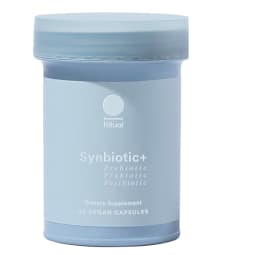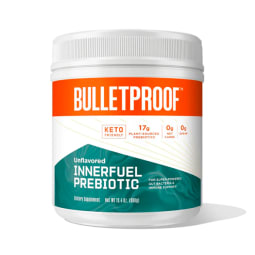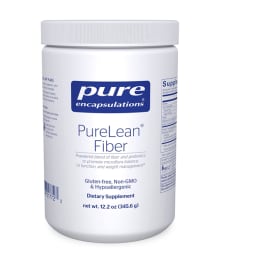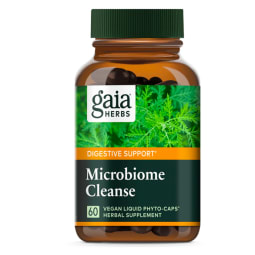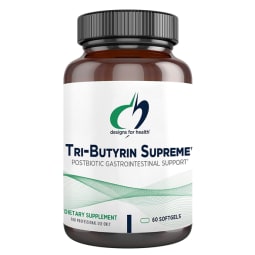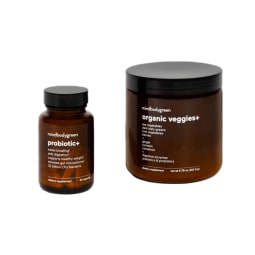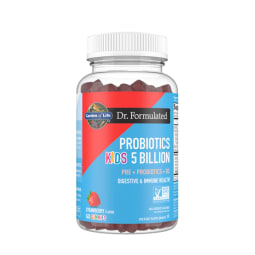But it also informs your ability to absorb nutrients properly—really, it plays a huge role in your overall well-being. The long and short of it: Gut health is key. And while your diet and exercise habits play a role in the state of your gut, there are additional things you can integrate into your daily routine that may elevate your gut microbiome and help you feel your best. Exhibit A: supplements. From probiotics to postbiotics and everything in between, the options are endless (and perhaps a bit overwhelming) when it comes to choosing your best gut-friendly fit. However, it is important to select a targeted supplement with your gut in mind. “If you’re looking to elevate and diversify your gut microbiome, a targeted probiotic rooted in science is not only prudent, it’s indicated,”* nutrition scientist and mbg’s vice president of scientific affairs Ashley Jordan Ferira, Ph.D., RDN, previously told mbg. Having a little trouble selecting your best fit? That’s where we come in. This versatile duo is what your body has been calling for, populating your gut microbiome with healthy bacteria to give your digestive system what it needs to thrive. “When this robust synbiotic duo is used consistently, it delivers a gut reset and over time, deeply nourishes multiple dimensions of GI health and digestive balance,” Ferira notes.* Essentially, when you care for your gut health, the rest of the body will follow suit and reap the benefits. The most important thing when it comes to supplementation, however, is consistency. “A lot of times, people think that they only need probiotics sometimes, but in fact, many of us would benefit from a daily, regular, and sustainable supply of targeted probiotics,” Ferira explains in a recent mbg TikTok. Some of the top-line benefits of caring for your gut are:* Selecting a supplement with ingredients that can actually support not only your gut microbiome but ultimately help with an array of daily GI functions (i.e., digestion, absorption, detoxification, and more) is essential—and there are a number of things to keep an eye out for. However, it all comes back to what your specific body needs because everyone is unique. “Prebiotic, probiotic, and postbiotic ingredients all have a place as targeted gut health solutions,” notes Ferira. “Other bioactives may include collagen peptides, key amino acids like glutamine, as well as an array of nutrients and actives that deliver antioxidant power and promote a healthy inflammatory response like vitamins C and E, turmeric, ginger, etc. Digestive enzymes, various herbs, and targeted postbiotic short-chain fatty-acid ingredients like tributyrin might also be useful to some individuals,” Ferira explains. Of course there are always going to be ingredients to avoid, as well, and Ferira notes that list includes artificial flavors and sweeteners; synthetic dyes and opacity agents like titanium dioxide, corn syrup, added sugars; and chemical preservatives (to name a few). Ferira has some pretty strict criteria when it comes to choosing a great, high-quality supplement worthy of your body (after all, this is your gut we’re talking about!), and this is what she looks for when selecting products that deserve to be in your gut health supplement lineup. Put simply, if your area of focus is gas and bloating, a targeted strain of probiotic can help those issues when taken consistently.* And then there’s poop: “If a person wants to infuse more fiber into their life (something all of us should strive for) to help with regularity, then a supplement that provides several grams of dietary fiber can promote healthy bowel movements when taken routinely,”* she adds. That being said, it’s common for the gut to need to adjust when adding in more fiber, so be patient with your body, and check in with a healthcare professional if you want a more personalized route. “While gut health supplements (e.g., fiber, probiotics, botanicals, and other bioactives) from high-quality brands are safe—any pregnant or lactating individual, or folks with other specific health considerations, should partner with a doctor to personalize their supplement regimen,” she adds. “Some probiotics are better to take before a meal, when stomach acid levels are lower, but that is still an area of active scientific research,” explains Ferira. “If you’re taking a fiber supplement that helps with laxation, some people might not take that right before bedtime, while others might find it’s totally fine to do so.”* If fiber is your supplement of choice, Ferira explains that it’s a good idea to look for an option that “offers 3 grams or more of functional fibers in order to support bowel movements in a meaningful way.”* Remember, if a product is simply “sprinkling” in ingredients, they’re likely not going to do much. Your diet and lifestyle can only take you so far—thanks to science innovation, leveraging targeted gut health supplements can help bring your GI tract and overall well-being to the next level.*












